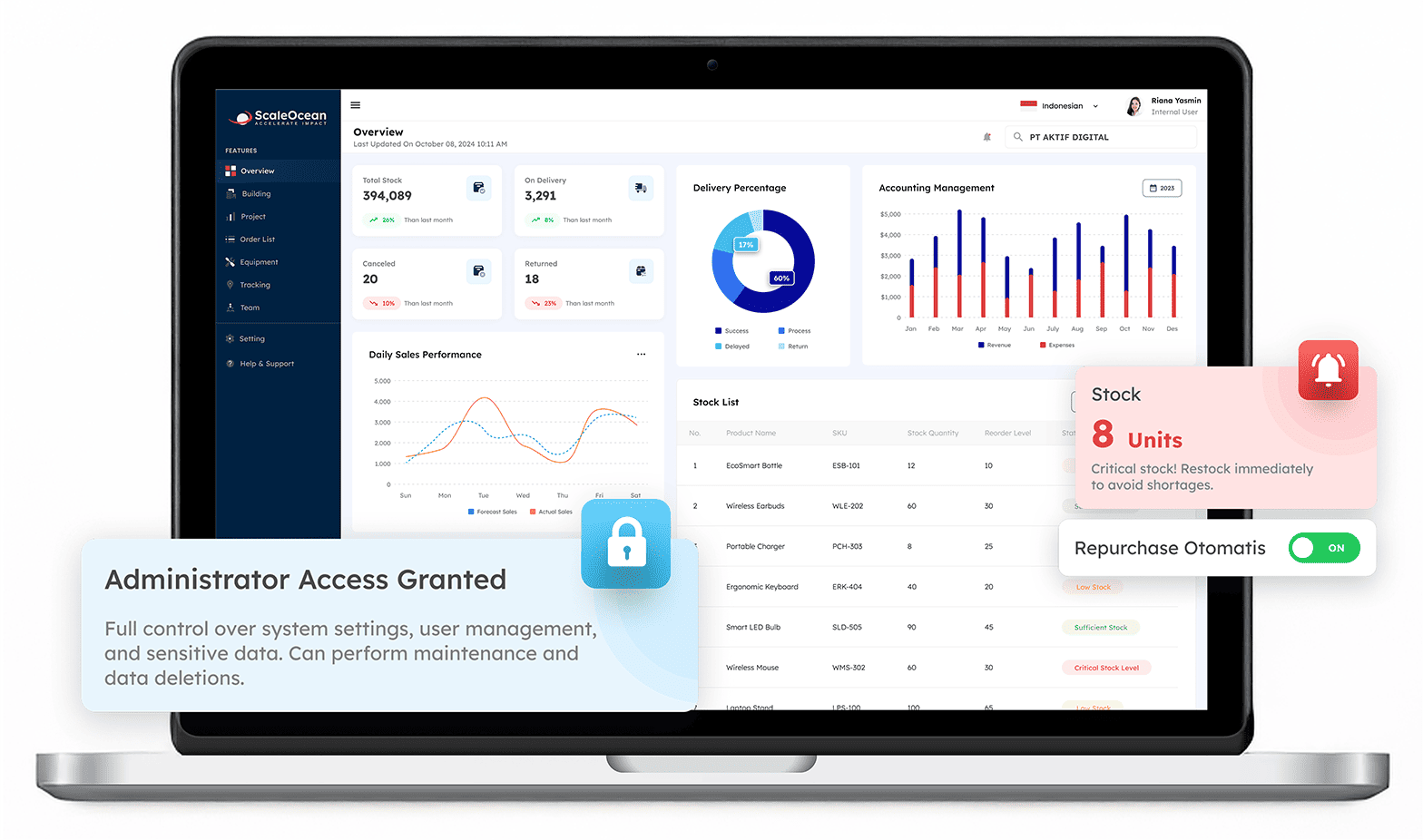Enterprise Resource Planning (ERP) systems are critical in Singapore’s dynamic business climate since they integrate operations such as finance, supply chain, human resources, and manufacturing into a consolidated platform. This integration boosts efficiency while ensuring exact data management. Singapore’s ERP software market is expected to increase by 3.83% between 2024 and 2029, reaching a market volume of US$188.70 million in 2029.
Implementing ERP systems has numerous benefits, including improved operations and scalability, which are critical for being competitive in a continually changing industry. However, it is critical to be mindful of potential implementation risks, especially when picking a provider that may not fully meet your business requirements. Careful study and planning are required to optimize the benefits of ERP implementation.
1. Benefits of ERP Systems
By improving data integrity, cutting expenses, and streamlining operations, ERP systems offer businesses significant benefits. They support companies in maintaining a competitive advantage in their marketplaces, focusing on strategic objectives, and operating more efficiently. By automating repetitive procedures and combining many corporate processes, Medium claims that putting in place an ERP system can increase efficiency by 20–30%.
ERP systems allow companies to more effectively manage resources and focus on accomplishing long-term goals by standardizing operations across many divisions. These technologies also guarantee that all team members have access to precise, up-to-date data and promote better collaboration.
a. Improved Efficiency and Productivity
ERP solutions reduce errors and free up staff members to concentrate on important projects like product development or customer engagement by streamlining repetitive processes like data entry and report generation. Businesses can increase efficiency, streamline procedures, and remove bottlenecks by automating workflows, especially in areas like order fulfillment and inventory management.
Proactive decision-making is supported by actionable information from advanced ERP analytics that help uncover inefficiencies. For instance, companies can reallocate resources or modify supply chain procedures to increase productivity and profitability. Businesses are able to keep a competitive edge in ever-changing marketplaces because of this ongoing improvement.
b. Enhanced Data Accuracy and Reporting
One of the primary advantages of ERP systems lies in their ability to centralize data management. For businesses seeking to learn what is ERP system, it serves as a comprehensive platform that consolidates business information, maintaining accuracy and uniformity across all departments. This ensures that every team works with reliable data, minimizing discrepancies.
Moreover, ERP systems provide real-time insights through advanced reporting tools, empowering decision-makers with actionable data to support strategic planning. By unifying and streamlining data processes, businesses can enhance their responsiveness to market demands.
c. Cost Savings
ERP systems enhance resource allocation, enabling businesses to pinpoint inefficiencies and areas where costs can be trimmed. By streamlining processes, they minimize waste, and improved inventory management helps reduce unnecessary spending. Over time, these efficiencies lead to significant cost savings, positively impacting the company’s financial performance.
Moreover, by eliminating redundant systems and consolidating tools, ERP platforms lower IT expenses. Companies can channel these savings into growth initiatives or innovation projects. Improved financial planning is another advantage that comes from the cost savings realized through ERP systems.
d. Improved Customer Service
By centralizing customer data within a single system, ERP platforms empower businesses to respond swiftly to inquiries, track orders, and anticipate customer needs. This increased visibility encourages personalized interactions and strengthens relationships, greatly enhancing customer satisfaction.
Quicker order processing and precise delivery tracking improve the overall customer experience. Additionally, the insights generated by ERP systems help businesses spot trends and refine their customer service strategies. A strong focus on customer needs fosters loyalty and encourages long-term retention.
e. Scalability and Flexibility
Modern ERP systems are built to grow alongside your business. As market conditions and operational requirements change, these systems adjust effortlessly, offering the flexibility to manage growth, introduce new product lines, or expand into new regions without major interruptions.
Additionally, ERP solutions provide modular options, enabling companies to add or change features as necessary. This flexibility helps businesses stay agile and responsive to evolving demands. Improved scalability ensures that companies can effectively tackle challenges during periods of expansion.
Also Read: Understanding Cloud ERP and Its Benefits for Businesses
2. Risks Associated with ERP Implementation

While ERP systems provide significant benefits, their implementation can be difficult without adequate planning and alignment with the vendor. The process requires thorough evaluation of resources, risks, and the organization’s readiness to fully leverage advantages and reduce disruptions. Here are some potential risks businesses may face:
a. High Implementation Costs
Implementing an ERP system comes with substantial initial expenses, such as software licensing, hardware installation, and employee training. If there isn’t a clear understanding of the return on investment (ROI), these costs can feel overwhelming.
To ease financial pressure, proper budgeting and a phased implementation approach are essential. Businesses should also consider financing options or grants that could help reduce upfront expenses. It’s crucial for organizations to balance initial costs with long-term advantages to support sustainable adoption.
b. Complex Implementation Process
The implementation process demands careful planning and execution. Without effective management, businesses may face delays, operational interruptions, and unmet project objectives, which can negatively affect overall performance.
Developing a comprehensive implementation roadmap and engaging experienced consultants can help reduce obstacles. Clear communication with all stakeholders is vital for a smooth rollout. Additionally, dedicated teams and strong change management practices can further facilitate seamless execution.
c. Resistance to Change
Employees often hesitate to embrace new systems, particularly if they view the ERP platform as complicated or a potential threat to their jobs. To tackle these concerns, effective change management strategies are crucial, including thorough training and clear communication.
Involving employees in the selection and implementation phases can help gain their support. Offering continuous assistance and resources can lead to smoother transitions. Additionally, fostering a culture of adaptability within the organization can reduce resistance over time.
d. Data Migration Challenges
Migrating data from outdated systems can result in problems like data loss, corruption, or compliance issues. Companies need to prioritize comprehensive data cleansing and migration strategies to minimize these risks.
Working with experienced vendors who specialize in data migration can help ensure data integrity. Conducting regular tests throughout the migration process allows for early identification and resolution of any issues. With careful planning, businesses can achieve data consistency after migration.
e. Security Vulnerabilities
Centralized data systems are often prime targets for cyberattacks. It’s essential to choose a vendor that has robust security protocols in place to safeguard sensitive business information from potential breaches.
Adding extra layers of security, like multi-factor authentication and conducting regular audits, can significantly improve protection. Additionally, businesses should provide ongoing training to ensure employees are informed about cybersecurity best practices. Taking a proactive stance on security helps reduce the risks linked to sensitive data.
Also Read: 4 Major Phases of ERP Implementation for Business Success
3. The Importance of Choosing the Right ERP Vendor
Choosing the right ERP vendor is essential for the successful implementation of your system. A suitable vendor guarantees that the ERP system aligns with your business objectives, facilitates scalability, and offers strong security. Here are important factors to keep in mind when selecting an ERP vendor:
a. Alignment with Business Needs
Choosing a vendor whose solution fits your operational goals is crucial. A customized ERP system promotes efficiency and minimizes the chances of facing implementation issues.
Carefully evaluating the vendor’s offerings and asking for a demonstration can help verify that their solution meets your needs. Vendors that provide industry-specific modules are often better suited to address unique requirements.
b. Vendor Support and Training
Robust support and training from the vendor make for a seamless transition. An easily reachable support team allows businesses to tackle challenges swiftly and keep the system running smoothly.
Regular updates and proactive communication from the vendor can significantly improve the user experience. Tailored training programs can equip employees to use ERP tools effectively. Ongoing support is key to ensuring the long-term success of the ERP implementation.
c. Scalability and Flexibility
An ERP solution should be able to adapt to future growth and changes in business processes. A system that is both scalable and flexible supports long-term goals without the need for frequent upgrades or replacements.
Vendors that provide modular systems enable businesses to enhance functionalities without interrupting ongoing operations. This approach ensures continuity as businesses develop. Additionally, flexible solutions effectively address industry-specific requirements.
d. Security Measures
An ERP solution needs to adapt smoothly to future growth and changing business processes, providing the scalability and flexibility necessary to support long-term goals. As noted by EC-Council, organizations should implement thorough security measures, such as regular updates, employee training, and ongoing monitoring, to effectively protect their ERP systems.
Vendors offering modular systems enable businesses to enhance functionalities without interrupting their current operations. This strategy helps maintain continuity as companies evolve and adapt. Furthermore, flexible ERP solutions cater to industry-specific needs, ensuring they stay relevant and effective in ever-changing environments.
4. Discover ScaleOcean’s ERP Solutions

ScaleOcean provides specialized solutions to fulfill the operational demands of Singapore enterprises looking for a scalable and reliable ERP system. Our platform connects effortlessly across industries, meeting specific business needs with precision and efficiency. ScaleOcean is designed to adapt to Singapore’s dynamic market, allowing businesses to easily navigate market shifts while supporting long-term growth and innovation.
ScaleOcean is a trusted partner for businesses looking to optimize processes and achieve long-term success. Request a free demo today to learn how ScaleOcean may improve your operations and help your company survive in Singapore’s competitive business environment.
- Customizable to Business Needs, ScaleOcean’s ERP system is designed to fit your unique industry and operational needs. Whether you operate in manufacturing, retail, or services, our specialized modules ensure the system aligns perfectly with your requirements.
- Streamlined Operations, by bringing together essential business functions like finance, supply chain, and human resources, ScaleOcean helps to remove redundancies and bottlenecks. This leads to smoother workflows and enhanced productivity throughout your organization.
- Enhanced Data Accuracy and Insights, Our platform centralizes data management, offering real-time, precise insights. With powerful analytics tools at your disposal, you can make well-informed decisions that foster strategic growth.
- Scalability for Growth, As your business grows, ScaleOcean’s scalable architecture allows your ERP system to expand alongside you. Whether you need to add new users, modules, or locations, ScaleOcean can accommodate your changing needs without any interruptions.
- Improved Security and Compliance, ScaleOcean places a strong emphasis on advanced security measures, including data encryption and regular audits, to safeguard your sensitive business information. Adhering to local and international regulations provides you with peace of mind.
- Cost-Effective Implementation, With flexible pricing options and eligibility for Singapore’s CTC grant, ScaleOcean offers an economical ERP solution. This allows businesses to lower initial costs while maximizing their return on investment.
- Continuous Vendor Support, ScaleOcean provides dedicated support and training to facilitate a smooth implementation process. Our team is always on hand to tackle challenges and deliver updates to keep your system functioning at its best.
Also Read: What is ERP System? A Detailed Description
5. Conclusion
ERP systems simplify operations, improve data accuracy, and lower costs, making them vital for sustainable business growth. By bringing together essential functions such as finance, supply chain, and human resources, they help businesses respond to shifting market demands while enhancing decision-making.
Nonetheless, it’s important to tackle potential challenges like high implementation costs and data security risks. Selecting the right vendor is crucial, and ScaleOcean offers a scalable, secure, and customizable ERP solution. Discover how ScaleOcean can revolutionize your business operations by requesting a free demo and see the advantages of a personalized ERP system for yourself.



 Click to Chat!
Click to Chat!